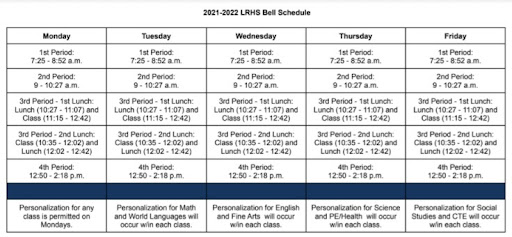Leesville Road High School runs on a block schedule consisting of four classes in each semester.
Leesville, along with other Wake County public schools, uses a “4 x 4” block schedule that puts classes into 90 minute periods. Students finish a course in one semester rather than a full year like in an “alternating-day” schedule.
Leesville originally had 6 fifty-five minute class periods that lasted over the course of the school year. That old schedule only allowed for a maximum of 24 credits, while the “4 x 4” block schedule allows for a maximum of 32 credits.
According to Mr. Green, the dean of students at Leesville, Leesville switched to a block schedule between 2002 and 2003. Leesville transitioned from year-long courses to a schedule that covers the entire curriculum in one semester.
Valerie Hendricks, a teacher at Leesville, has been working at Leesville for a number of years. Hendricks was at Leesville when the schedule changed, and she understands how both schedules play an effect on students.
“When I first made the switch, it was a big adjustment.” After years of using the block schedule, Hendricks began to see greater benefits. “While the classes are long, it’s fewer changes to deal with,” said Hendricks.
A downside of block scheduling is the 30 hours less of instructional time. Teachers have limited time to build bonds with their students. “Some subjects would benefit from having a yearlong course,” said Hendricks.
The benefits of block schedules, in the long run, outweigh the day-to-day tribulations in Hendrick’s opinion.
One of the long term effects of block schedule is lower or higher AP test scores depending on the semester a student took the course in.
Besides AP Calculus, the AP’s offered at leesville are only one semester long. College Board releases state exams in May for the students who completed or are currently completing an AP course. If the students passes the exam, they might receive college credit.
Students who took an AP course in the first semester have to refresh their memory on the course material months after their last lecture on the topic.
Stephanie Langlois, an AP human geography teacher at Leesville, said there are pluses and minuses to the block schedule.
The spring semester of an AP course has its own set of issues. “Students could have up to four weeks less of preparation before the exam,” said Langlois. Meanwhile, AP students in the fall learn all the course material before the exam, but the information isn’t fresh by exam day.
“While a year-long schedule would make more sense, this style prepares students for college better,” said Langlois.
On the traditional schedule, students would have full instruction before the AP test, but less opportunity to try new AP courses. A student has a greater chance of a higher GPA with block scheduling, but problems revolved around timing of the AP test are not considered
The transition in January from the first semester to the second semester is challenging. Sabra Feeney, a counselor at Leesville, describes it as, “chaotic and hard to make the puzzle work.”
Feeney believes that Leesvile does a good job of preparing students for the AP exams regardless of the semester they took them in.
“I wish the College Board would recognize the schedule that we run on, but we make it work,” said Feeney.
What Feeney believes poses the biggest threat to a student’s education is the timing of finals in the first semester. “The winter break is inorganic, and it doesn’t align with college schedules,” said Feeney.
Block schedules start students’ school year later in August which pushes back their entire year long schedule. Instead of finals falling before winter break like it does in college, finals are two weeks after the return from winter break.
Feeney believes that if students finished their first semester in December, the break would allow for an easier transition and better outcomes on the finals.
A very important part of a student’s high school career is their electives. “High school should really be about exploring electives and courses and block schedules sometimes prevent that from happening,” said Feeney.
While students will receive less hours of instruction for an elective class, they have more opportunities to try new electives.
“I wish there was an ideal schedule where some courses are offered year long, but in the bigger picture, what we do makes sense,” said Feeney.
Meanwhile, from a student’s perspective, Leesville’s block schedule is much better than an alternating day schedule.
John Mark Shaw switched from Broughton to Leesville his junior year. Broughton uses an alternating day schedule (the A / B day), but to his surprise, he prefers Leesville’s schedule better.
“I’m way less overwhelmed with only four classes at a time,” said Shaw. The timing of finals and AP tests don’t bother Shaw. “I get to see the same teacher and students every day for a semester making it way less stressful.”
Teachers and administrators at leeville believe that block schedule properly prepares students for what college will be like.
Block schedules can be limiting, but it overall prepares students for what their next four years will look like.

Hi! I’m Alexis Mast, but I answer to Lex as well. I’m a year round and high school swimmer whose been in Newspaper class since sophomore year. I write about anything, everything, and trending Leesville news.

Leave a Reply